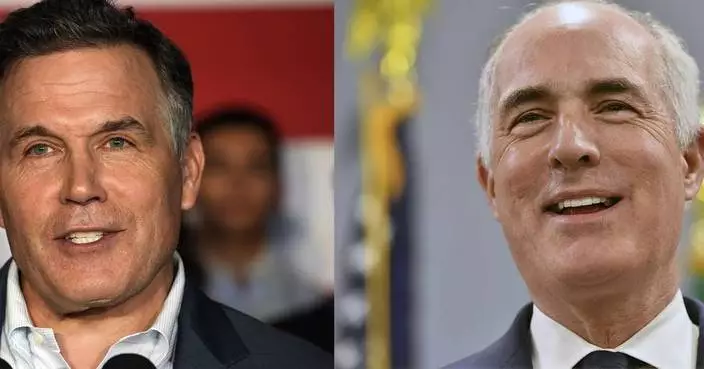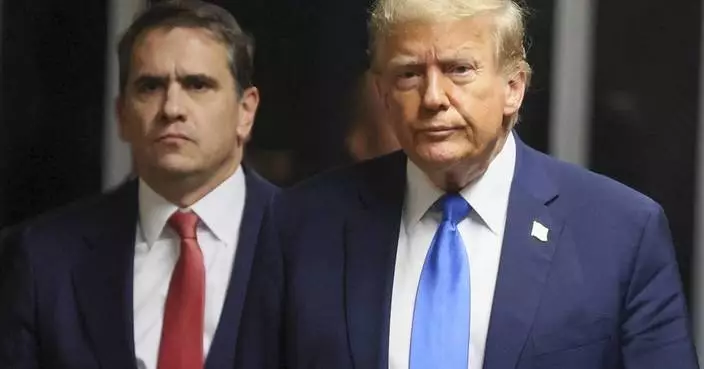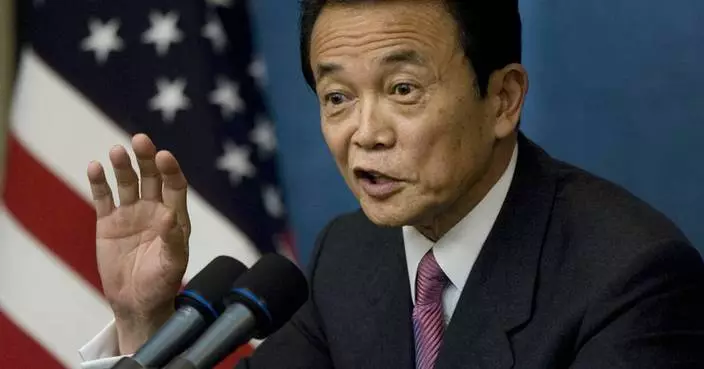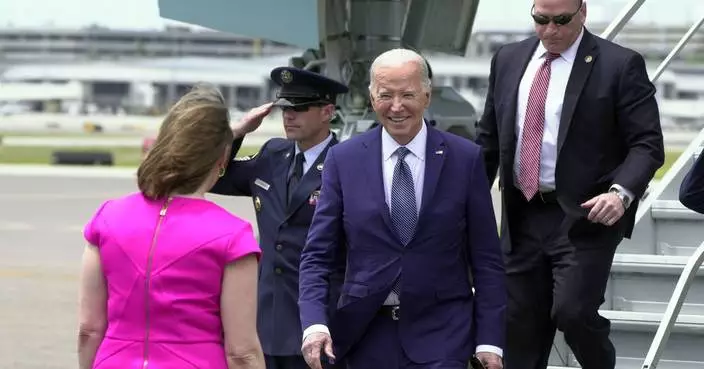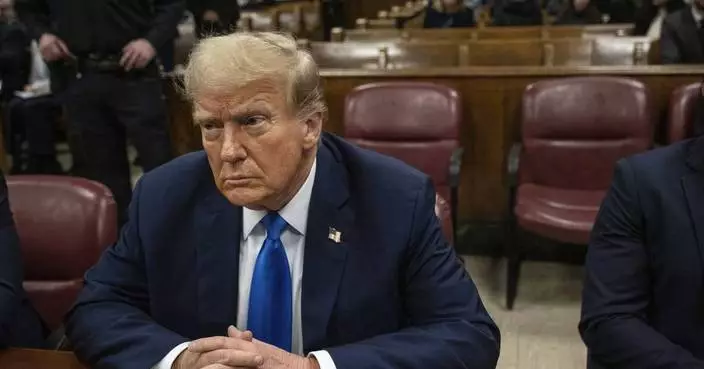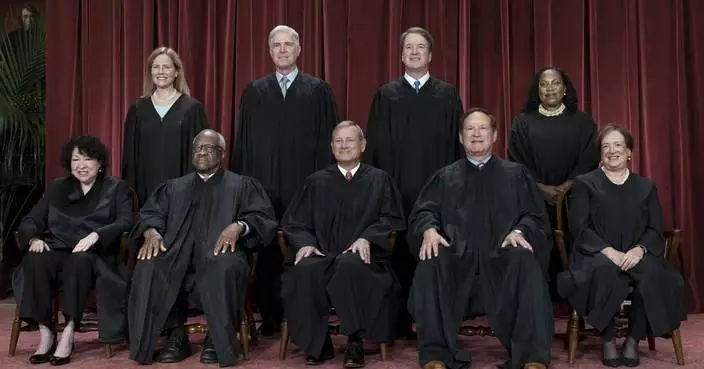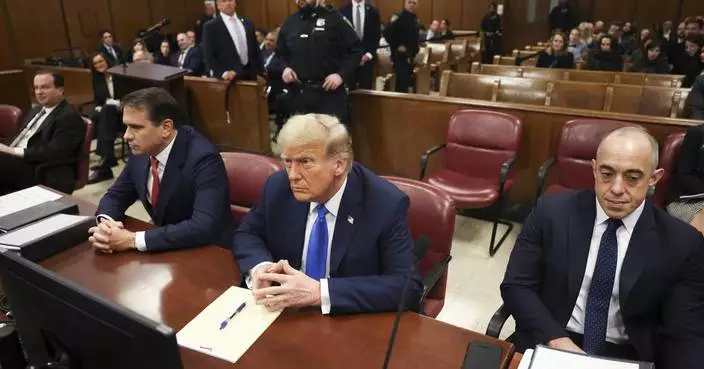With Europe's wary eyes upon him, President Donald Trump launched a weeklong trip there on Tuesday with harsh criticism for NATO allies and predicted the "easiest" leg of his journey would be his scheduled sit-down with Russian President Vladimir Putin.
As he departed the White House for a four-nation European tour, Trump did little to reassure allies fretting over the risk of damage he could do to the 69-year-old trans-Atlantic mutual defense pact and his potential embrace of Putin during a summit in Helsinki.
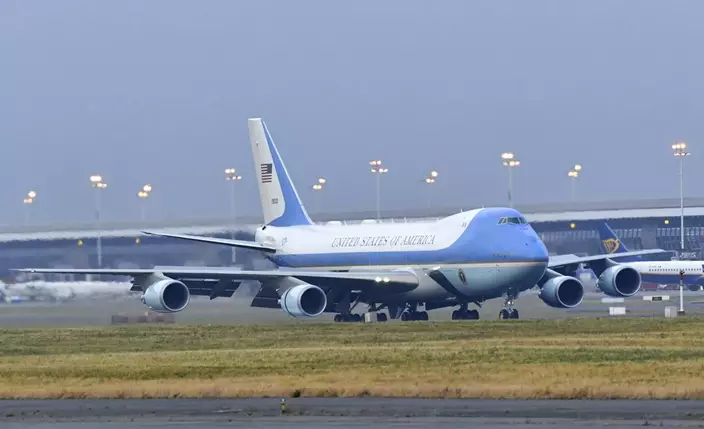
Air Force One touches down at Melsbroek Military airport in Melsbroek, Belgium, Tuesday, July 10, 2018. U.S. President Donald Trump landed in Brussels on Tuesday and will attend a two-day NATO summit. (AP Photo/Geert Vanden Wijngaert)
Trump said Tuesday he "can't say right now" if Putin is a friend or foe, but called him a "competitor." The U.S. intelligence community has concluded that Russia interfered in the 2016 election to boost Trump's candidacy, and warns of further attempts at interference both in the 2018 midterms and in European elections.
Trump arrived in Brussels on the eve of the NATO summit after repeated attacks on the pact. He told reporters in Washington before leaving that "Frankly it helps them a lot more than it helps us" and then later tweeted from Air Force One that he may demand reimbursements from the European member nations.
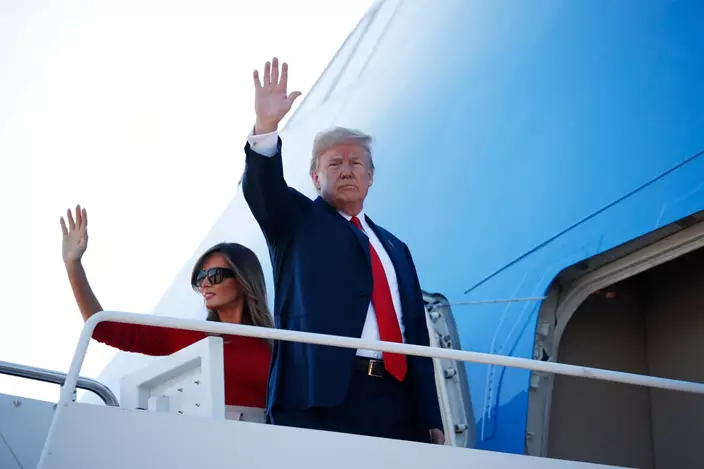
President Donald Trump and first lady Melania Trump board Air Force One, Tuesday, July 10, 2018, at Andrew Air Force Base, Md. Trump is traveling on a weeklong trip to Europe on a four-nation tour, with stops in Belgium, England, Scotland and Finland. (AP Photo/Pablo Martinez Monsivais)
Trump has been pressing NATO countries to fulfill their goal of spending that 2 percent of their gross domestic products on defense by 2024. During his presidential campaign, he suggested he might only come to the defense of NATO nations that fulfilled their obligation. And a year ago, during his first visit to its Belgium headquarters, Trump initially declined to explicitly support the organization's defense agreement.
Trump, who landed in Belgium during the middle of the soccer-mad nation's World Cup semifinals match, will later head to London, where Prime Minister Theresa May's government is in turmoil over her plans for exiting the European Union.
European Council President Donald Tusk said on Tuesday in a message to Trump that "it is always worth knowing who is your strategic friend and who is your strategic problem." Tusk recalled that the Europeans are spending more than Russia and as much as China on defense. NATO estimates that 15 members, or just over half, will meet the benchmark by 2024 based on current trends.
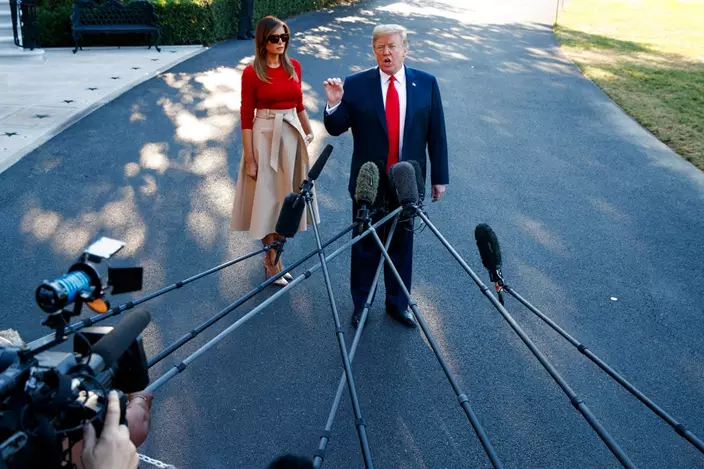
First lady Melania Trump looks on as President Donald Trump speaks with reporters before boarding Marine One on the South Lawn of the White House, Tuesday, July 10, 2018, in Washington. (AP Photo/Evan Vucci)
"Getting ready to leave for Europe. First meeting — NATO. The U.S. is spending many times more than any other country in order to protect them," Trump tweeted Tuesday morning, adding: "Not fair to the U.S. taxpayer. On top of that we lose $151 Billion on Trade with the European Union. Charge us big Tariffs (& Barriers)!"
On Monday he'd tweeted the situation was "not fair, nor is it acceptable," and insisted that NATO benefits Europe "far more than it does the U.S."
He added: "NATO countries must pay MORE, the United States must pay LESS. Very Unfair!"
Trump, who has compared the sentiment that underpinned the Brexit vote to leave the EU to his own election, will be making his maiden presidential trip to Britain at a fraught time for May. Foreign Secretary Boris Johnson and Brexit Secretary David Davis resigned within hours of each other in protest of her plan. Trump said might meet with Johnson in the UK despite his resignation.
Trump's visit is expected to attract large protests in London and elsewhere in Britain.
Trump's weeklong trip to Europe will continue with a stop in Scotland before ending with a sit-down in Helsinki with Putin.
He said that of the high-stakes meetings of his trip, "Putin may be the easiest of them all."
"I think that getting along with Russia, getting along with China, getting along with others is a good thing, not a bad thing," he added.
The meeting will be closely watched to see whether Trump will rebuke or embrace Putin, who has repeatedly denied the allegations of election meddling, in spite of evidence to the contrary.
WASHINGTON (AP) — The Supreme Court hears arguments Thursday over whether Donald Trump is immune from prosecution in a case charging him with plotting to overturn the results of the 2020 presidential election.
It's a historic day for the court, with the justices having an opportunity to decide once and for all whether former presidents can be prosecuted for official acts they take while in the White House.
But between a decades-old court case about Richard Nixon, and an obscure constitutional provision about presidential impeachments, there are likely to be some unfamiliar concepts and terms thrown about.
Here are some tips to help follow everything:
The court marshal will bang the gavel at 10 a.m. EDT and Chief Justice John Roberts will announce soon after the start of arguments in Donald J. Trump vs. United States of America, as the case is called.
The session easily could last two hours or more.
There are no cameras in the courtroom, but since the pandemic, the court has livestreamed its argument sessions. Listen live on apnews.com/live/trump-supreme-court-arguments-updates or the court’s website at www.supremecourt.gov. C-SPAN also will carry the arguments at www.c-span.org.
Expect to hear talk about the impeachment process and the relationship, if any, to criminal prosecution.
Central to Trump's immunity argument is the claim that only a former president who was impeached and convicted by the Senate can be criminally prosecuted. Trump was impeached over his efforts to undo the election in the run-up to the violent riot at the U.S. Capitol on Jan. 6, 2021. But he was acquitted, not convicted, by the Senate in 2021.
Trump's lawyers cite as backup for their argument a provision of the Constitution known as the Impeachment Judgment Clause that says an officeholder convicted by the Senate shall nevertheless be “liable and subject to indictment, trial, judgment and punishment” in court.
Prosecutors say the Trump team is misreading the clause and that conviction in the Senate is not a prerequisite for a courtroom prosecution.
There's going to be plentiful discussion about Nixon but not necessarily for the reasons one might think.
Trump's team has repeatedly drawn attention to a 1982 case, Nixon v. Fitzgerald, in which the Supreme Court held that a former president cannot be sued in civil cases for their actions while in office. The case concerned the firing of an Air Force analyst, A. Ernest Fitzgerald, who testified before Congress about cost overruns in the production of a transport plane.
Fitzgerald's lawsuit against Nixon, president at the time of the 1970 termination, was unsuccessful, with Justice Lewis Powell writing for the court that presidents are entitled to absolute immunity from civil lawsuits for acts that fall within the “outer perimeter” of their official duties.
Importantly, that decision did not shield presidents from criminal liability, though Trump's team says the same analysis should apply.
Special counsel Jack Smith's team is also likely to bring up a separate Supreme Court decision involving Nixon that they say bolsters their case — a 1974 opinion that forced the president to turn over incriminating White House tapes for use in the prosecutions of his top aides.
Prosecutors have also noted that Nixon accepted rather than declined a subsequent pardon from President Gerald Ford — a recognition by the men, they say, “that a former President was subject to prosecution.”
The justices are known to love presenting hypothetical scenarios to lawyers as a way of testing the outer limits of their arguments. Expect that practice to be on full display Thursday as the court assesses whether former presidents are entitled to absolute immunity.
Already, Trump's lawyers have warned that if the prosecution is permitted to go forward, it would open the floodgates to criminal charges against other presidents, such as for authorizing a drone strike that kills a U.S. citizen or for giving false information to Congress that leads the country into war.
In a memorable moment during arguments in January before a federal appeals court, a judge asked a Trump lawyer whether a president who ordered a Navy SEAL to assassinate a political rival could be prosecuted.
Look for Smith's team to try to draw a sharp distinction between acts that it says are quintessential exercises of presidential power — such as ordering a drone strike during war — to the acts that Trump is accused of in this case, such as participating in a scheme to organize fake electors in battleground states. Those acts, prosecutors say, are personal acts and not presidential ones.
Associated Press writer Mark Sherman contributed to this report.
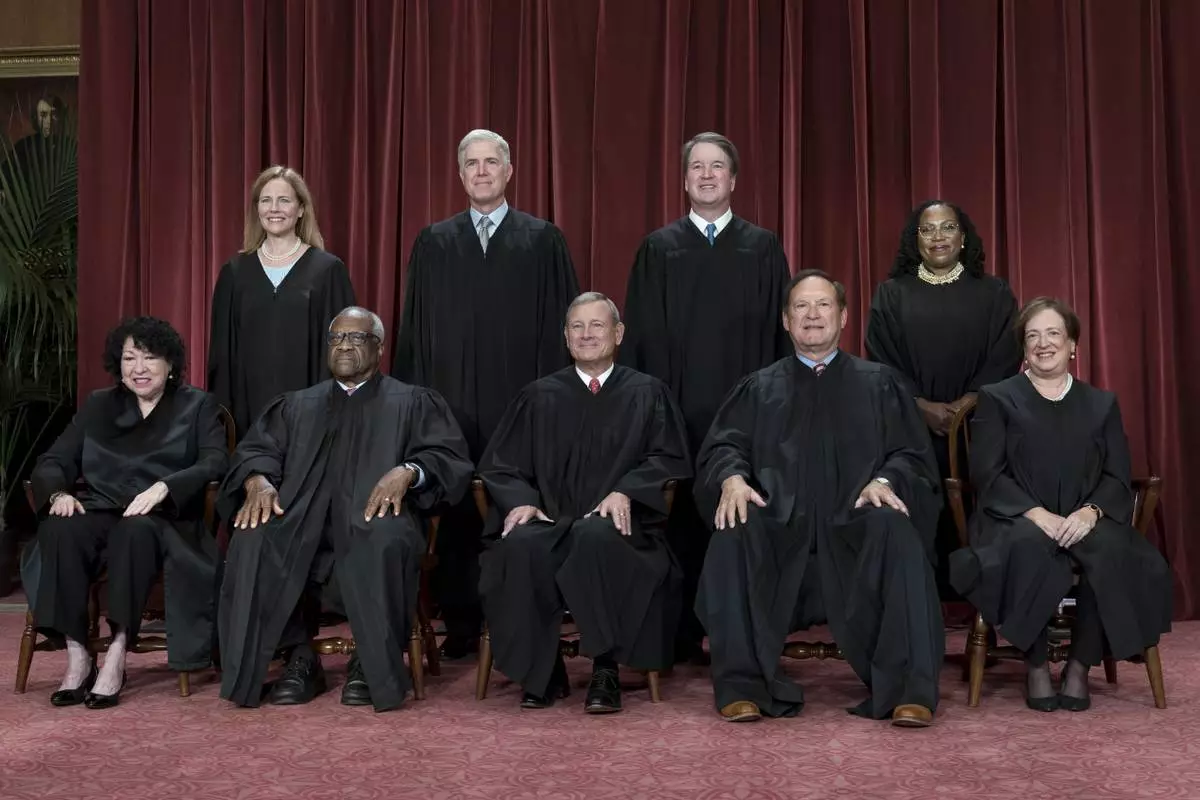
FILE - Members of the Supreme Court sit for a new group portrait following the addition of Associate Justice Ketanji Brown Jackson, at the Supreme Court building in Washington, on Oct. 7, 2022. Bottom row, from left, Associate Justice Sonia Sotomayor, Associate Justice Clarence Thomas, Chief Justice of the United States John Roberts, Associate Justice Samuel Alito, and Associate Justice Elena Kagan. Top row, from left, Associate Justice Amy Coney Barrett, Associate Justice Neil Gorsuch, Associate Justice Brett Kavanaugh, and Associate Justice Ketanji Brown Jackson. The core issue being debated before the Supreme Court on April 25, 2024, boils down to this: Whether a former president is immune from prosecution for actions taken while in office — and, if so, what is the extent of the immunity? (AP Photo/J. Scott Applewhite)
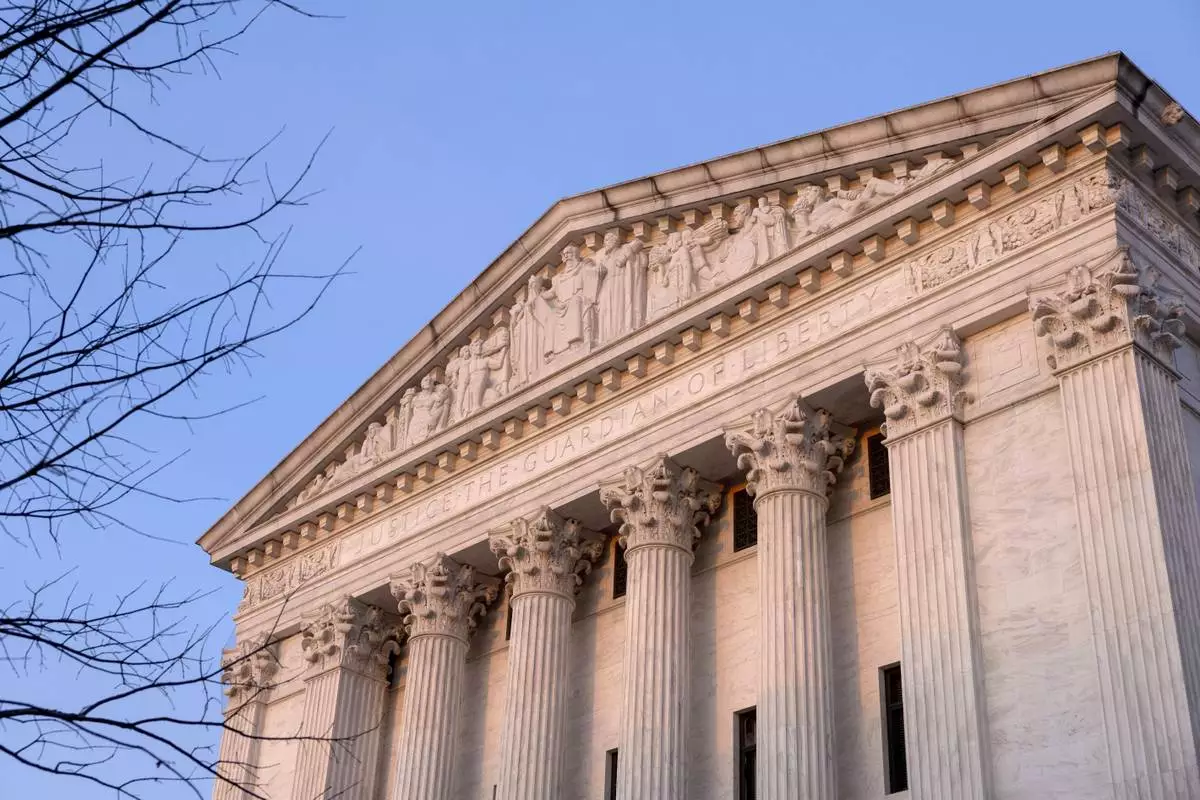
FILE - The Supreme Court of the United States is seen in Washington, March 26, 2024. The Supreme Court is hearing arguments this week with profound legal and political consequences: whether former President Donald Trump is immune from prosecution in a federal case charging him with plotting to overturn the results of the 2020 election. (AP Photo/Amanda Andrade-Rhoades, File)
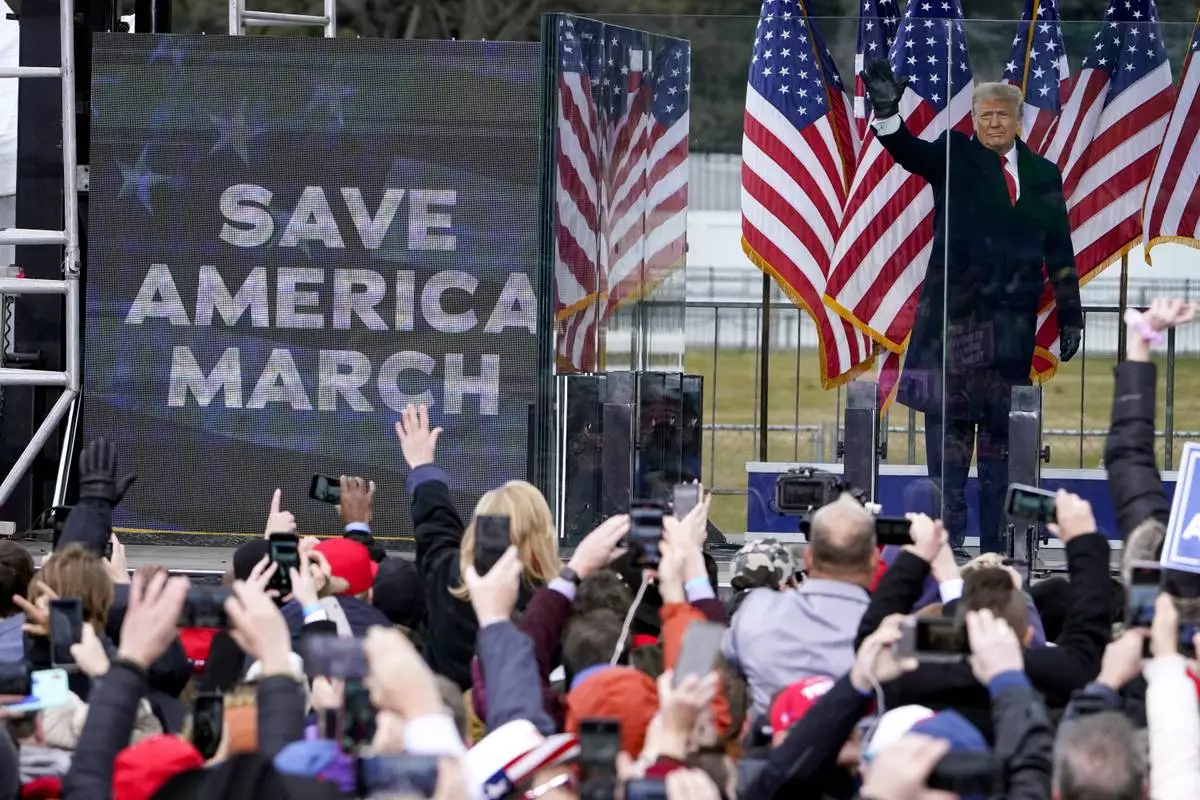
FILE - President Donald Trump arrives to speak at a rally in Washington, on Jan. 6, 2021. The Supreme Court will hear arguments over whether Trump is immune from prosecution in a case charging him with plotting to overturn the results of the 2020 presidential election. (AP Photo/Jacquelyn Martin, File)









